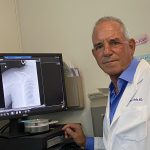TR: How have you and your patients adapted to using telemedicine?
Dr. Gaylis: Telemedicine was very helpful for maintaining a conversation with our patients and trying to help them when they couldn’t get into the office. It’s still a challenge for some of our older patients to use, and I’d much rather do a face-to-face visit because there is a certain chemistry between you and your patient that doesn’t come through on telemedicine.
TR: Are you planning to continue telemedicine services post-COVID-19?
Dr. Gaylis: As long as there’s a demand and the insurance companies keep on reimbursing, we’ll definitely do it. It’s extremely important for those people who don’t have transportation, who physically don’t have the capacity to come to us, who are nervous or apprehensive and who they themselves may be symptomatic.
From a rheumatology perspective, being able to give people injections or infusions or do any kind of studies, such as X-rays—we obviously can’t do that with telemedicine. But it works to a certain point.
TR: How has the pandemic affected other aspects of your practice?
Dr. Gaylis: We haven’t opened up our physical therapy and rehab department because there’s still a very limited population of patients who want to come in and have a therapist work with them in close proximity. Besides that, we’ve pretty much gotten back into doing all the various services we offer, including infusions, bone density screenings and X-rays.
The clinical research was probably the area in our office that got hurt the most. Clinical research was very dependent on the pharmaceutical industry, which sponsors the studies. And they pretty much shut down the research studies during the pandemic. Having spoken to my rheumatology colleagues, the reduction in research business has been huge for all of us. We’ve got to get that back up and running because it’s important for pharma and ourselves—and also for our patients so we can get the right treatments for them that they otherwise wouldn’t have access to.
TR: How are you advising patients on COVID-19 vaccination, and are you using ACR resources to help?
Dr. Gaylis: We’re using the guideline for our standard vaccines, whether it’s influenza, shingles or others.
I’m not touching on the COVID-19 vaccine at this point, because there’s nothing to talk about. We don’t have a vaccine. So at this point, I’m going to say to [patients], let’s just wait and see.



